Goods and Services Tax in Sierra Leone, A Decade On: Going Down Memory Lane

Alfred Akibo-Betts
CEO - The Betts Firm
By Alfred Akibo-Betts.
At the end of 2019, I resigned from my job as a Deputy Commissioner at Sierra Leone’s National Revenue Authority (NRA). I consider this singular action a pivotal moment in my professional life. As I started reflecting on some of the critical moments that transformed my life from a young graduate joining the NRA as a Collector (Junior Supervisor) to leaving as a Deputy Commissioner with a wealth of experience in the sixteen (16) years I was at the authority, I decided to narrate the GST implementation story. I am quite sure that telling this story would not only help finetune my next steps but will also serve as a lesson for the young generation of professionals and our country.
As we moved into the new decade in 2010, Sierra Leone had another opportunity to re-engineer its drive towards economic transformation, which was geared towards improving the lives of its citizens. One of the few reforms adopted at the time was the introduction of the Goods and Services Tax. Amongst a pool of very bright and vibrant young graduates, I was fortunate to have been chosen to lead this vital reform. Today, the overall impact of this tax system since its introduction in 2010 cannot be overemphasised. Interestingly, the implementation of GST in 2010, which I led, coincided with a boom in the economy as a result of the growth of the mining sector from 2010-2013. As we march into the 2020s, we as a country need to think about how we can capitalise better on the next big windfall whether it is investments in non-mining sectors, extractives, taxes or another event.
As a young professional, I led a significant revenue mobilisation project that changed tax administration in Sierra Leone, and no doubt has provided for the government billions of Leones used to improve the economy and the lives of Sierra Leoneans. For context, GST collections have grown from Le 246 Billion in 2010 to Le 1.03 Trillion in 2019 and is the second-largest revenue source for the government after Income Taxes. These taxes contribute to, amongst other things, infrastructural development, education and healthcare initiatives in the country. Leading the implementation of Goods and Services Tax (GST) stands out as the most exceptional service I have provided to my country and, I am incredibly proud of this contribution.
This story reflects on my involvement in the introduction of GST, vital moments during the implementation, GST's contribution in terms of revenue, and critical policy considerations of the tax.
The Beginning
I still remember how my GST journey started like it was yesterday. I had just passed my final ACCA exams to become a Chartered Accountant when on a hot March afternoon in 2006 the then Deputy Commissioner-General (DCG) of the National Revenue Authority (NRA), Ousman Barrie called me to his office to discuss my future. The NRA was a new organisation the government had formed in 2003 to reform tax administration. NRA took over from the ineffective and inefficient stand-alone institutions of revenue generation, and I was fortunate to be part of the first intake of young graduates recruited. The organisation at the time was implementing its first big reform project supported by the United Kingdom's Department for International Development (DfID) and wanted younger, fresh thinking, and innovative staff to lead the various projects that were being implemented. In hindsight, I believe his choice of me cannot also be unconnected with the leading role I had played at the time when the NRA took over the collection of Non-Tax Revenues from Government Ministries, Departments and Agencies (MDAs). As a 26-year-old that had just finished a professional course and had already been part of a project at the authority, I guess I fitted the bill.
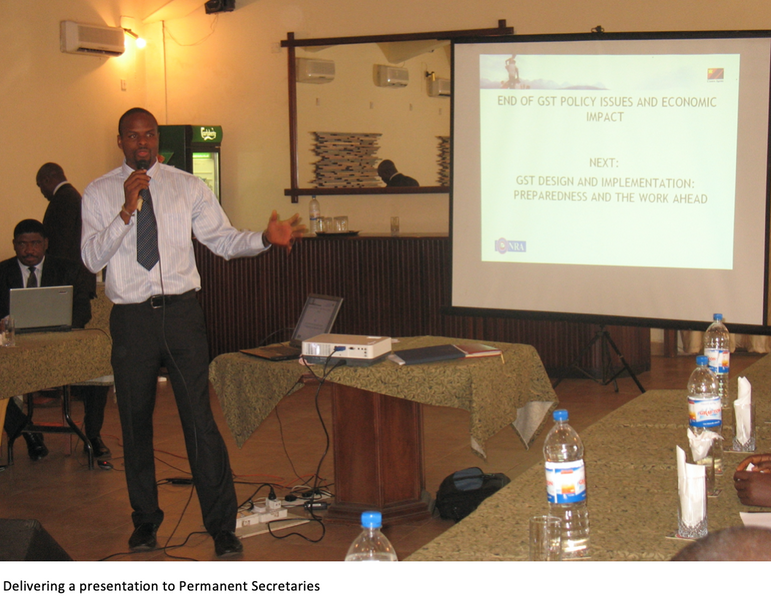
During our discussion, Ousman Barrie sketched on a piece of paper (I wish now I had kept that piece of paper as it was a significant part of my career journey) two different career routes for me - taking charge of the implementation of Value Added Tax (VAT) - same as GST, or leading the new Capital Gains Tax/Rent Project. I jumped at the VAT Project for four reasons:
1) It was a new tax for Sierra Leone;
2) I was excited about the prospect of learning a new concept;
3) The challenge of successfully implementing a tax project; and
4) Being part of VAT history, as I would be a member of a unique club of persons that had been in charge of implementing the tax worldwide.
A week later, I was transferred to lead the VAT project and to work closely with Crown Agents, an international consultancy firm that was chosen by DfID to assist the NRA on its reform agenda. I worked directly with Crown Agents' Team Leader, George Blankson (who would later become Ghana Revenue Authority's first Commissioner-General) on the project. George later became my mentor and had the most significant impact on my career. In the early days, I didn't have an office and had to work in the conference room at the NRA Head Office, and on numerous occasions had to move to the hallway to work when meetings were taking place.
Implementing GST
GST was replacing seven taxes - Restaurant & Food Tax, Entertainment Tax, Domestic Sales Tax, Professional Services Tax, Hotel Accommodation Tax, Import Sales Tax and Messages Tax. Working with Crown Agents (CA) in the first few months of the project, we had a few priority issues to address. Firstly, we needed to form an implementation team to work with all the short and long term CA consultants, build a governance structure that will oversee the implementation of the project, and design an implementation plan that will guide the implementation process. The aim was to keep the implementation team as small as possible, and when we recruited internally, we were lucky to have two great people to work with us on the project - James Tengbeh, now the Assistant Commissioner of Audit at NRA and Kenei Kangbai who now leads the Tax Audit Unit at the Large Taxpayers Office. James was the first person to join the team and, throughout the implementation, both of us worked closely with CA consultants, sometimes till late in the evenings working on building systems, designing tax policy, drafting the GST law, designing the publicity plan and engaging stakeholders.
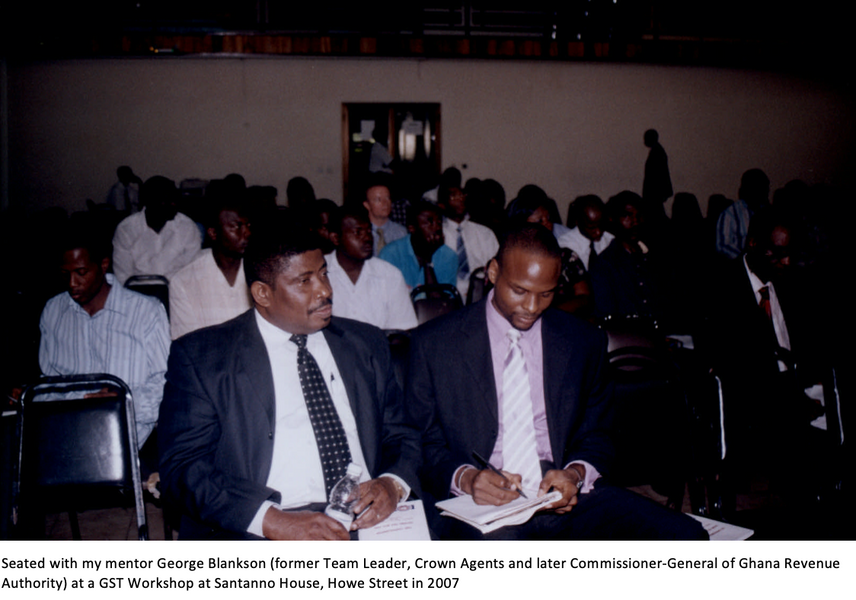
Regarding the governance structure, the project team decided to form a Project VAT Oversight Committee later renamed Project GST Oversight Committee (PGOC) to oversee the project. About that name change. At the start of the project, the tax was called Value Added Tax (VAT) but was later changed to Goods and Services Tax when the then Minister of Finance, John Benjamin suggested we rename the tax GST as it was easier for citizens to understand the new tax and aid communication in our local languages while removing the negative connotation (false) perception of VAT, as being a tax that would excessively increase pricing. The PGOC had five (5) thematic areas: Policy; Legislation; Publicity & Tax Education; Information, Communication & Technology; and Human Resource Management. The PGOC was chaired by the Commissioner-General Dr John Karimu and Co-Chaired by Ousman Barrie, the DCG and the Crown Agents Team Leader, George Blankson. The plan was to make the PGOC very inclusive as we recognised the importance of the private sector. Therefore, private sector players including the Chamber of Commerce, Sierra Leone Indigenous Business Association and the Institute of Chartered Accountants of Sierra Leone were members, and the public sector was represented by NRA, Ministry of Finance and Ministry of Trade. The PGOC's thematic areas reported to the main PGOC and were first tasked with designing an implementation plan for the project. With the governance structure, implementation plan and project team in place, we were primed to move things forward. In subsequent years, the project engaged in the following activities:
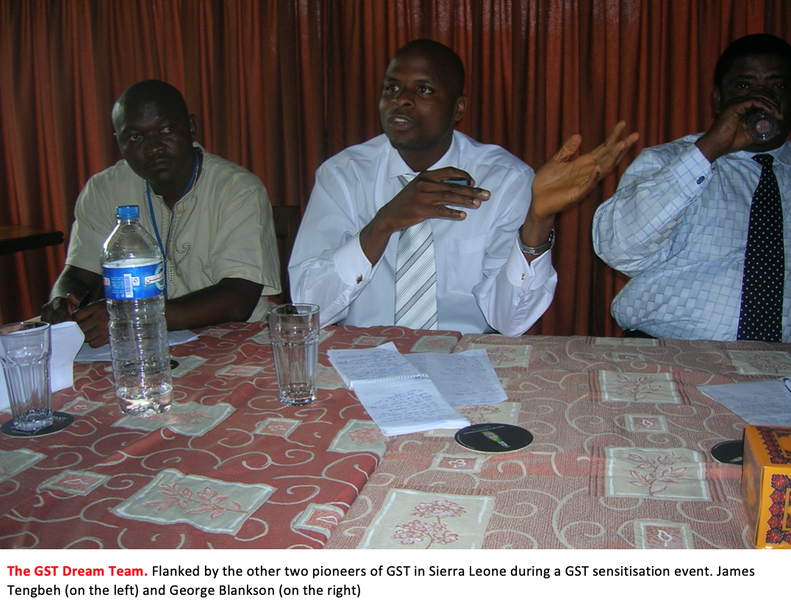
Policy Decisions. A vital step in implementing a new tax is to get the policy decisions right. The policy decisions determine how the tax is structured and the impact the tax will have on citizens, businesses, the economy and tax revenue. The policy options eventually feed into the tax law. In the first few months of the GST Implementation Project, the PGOC had to decide on various aspects of the new tax, e.g. the tax rate, the type of exemptions, the GST threshold, the appeals process, the penalty structure etc. The PGOC decided to use a rigorous process of analysing each policy option in terms of its impact on the economy, the revenue yield, and its application in other African countries. The project team worked with the Revenue and Tax Policy Division of the Ministry of Finance to develop three policy papers for the Minister of Finance, which formed the basis of the Draft GST Bill.
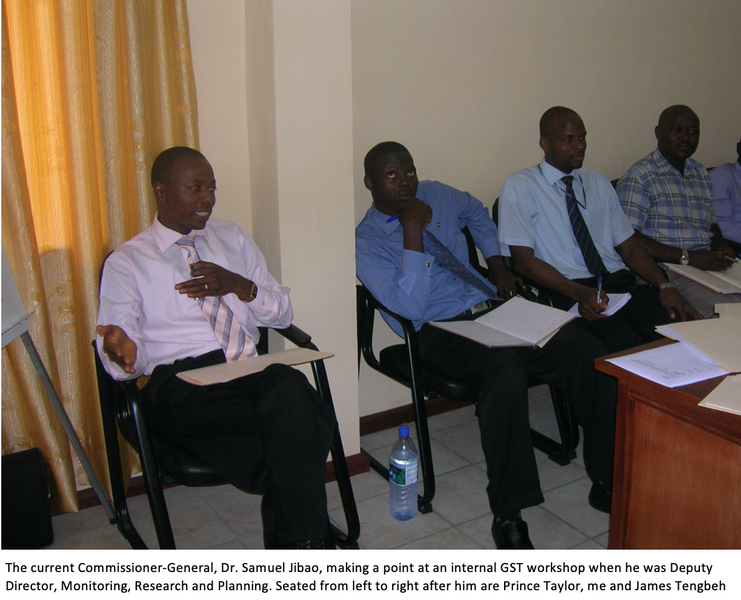
Creating the GST Administration Unit. The new tax needed a home as the PGOC decided that it would be a separate unit until the tax stabilised. Since GST was a new tax, we followed international trends in structuring the new unit. The new GST Administration Unit was structured along operational functional lines of Tax Registration & Services, Returns & Payments Processing, Audit and Enforcement; with a separate policy unit. The two other tax departments of Income Tax and Customs & Excise were structured differently along tax types lines but eventually changed to functional lines to reflect international best practice.
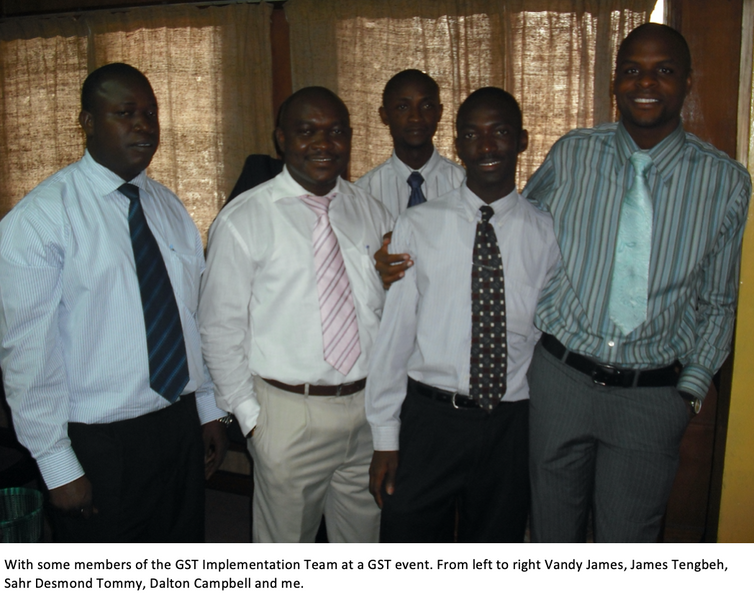
After getting Board approval to form the GST Administration Unit, we then proceeded to recruit a brilliant group of staff that continue to make a positive impact on the organisation. We trained these staff in collaboration with Crown Agents.
Nationwide Publicity and Tax Education. Lessons learnt from other countries that had implemented VAT/GST including Ghana, made it imperative to execute a very robust publicity campaign to ensure that all the relevant stakeholders including the government, private sector and citizens understood the complexities of the new tax. As we embarked on the nationwide publicity exercise, we made presentations to the cabinet with the President, Dr Ernest Bai Koroma present, Parliamentarians, Government MDAs and Local Councils. We also organised workshops for universities and colleges, holding engaging discussions on the campuses of Njala University, Fourah Bay College and the Institute of Public Administration and Management.
VAT/ GST had been implemented in over one hundred countries before Sierra Leone. We understood that implementations had failed when the education of taxpayers was not made a priority; therefore, we were determined not to make similar mistakes. Registered taxpayers were classified as critical stakeholders in the GST administration process as they charge the tax on behalf of the government and remit monthly. To ensure businesses were ready for the tax, we adopted two approaches – workshops with business groups and one-on-one education of all taxpayers that we registered for the tax. Those interactions were exciting as it was the first time the tax authority had actively engaged taxpayers for a tax handle. I still remember an interaction with a business group up in a high building at their headquarter in the central business district of Freetown where the discussions got so heated that James Tengbeh and I joked after that we thought they were about to throw us off the roof. Experiences of such however prepared us for future engagements when we actively administered the tax.
In addition to the interactions with all the relevant players, we were actively present in the media having discussions on radio and TV, and to this day, I cherish memories of those discussions, which were sometimes held at night to capture a wider audience. We also designed and distributed tax information leaflets and brochures, erected billboards and regularly engaged taxpayers at roadside tax clinics in business districts.
⁃ Enactment of the GST Act 2009. The story of enacting the GST Bill into law is one of the most excellent shows of political harmony I have seen in Sierra Leone. The GST implementation process started in 2006, under the administration of the late President Dr Ahmad Tejan-Kabbah, but was fully implemented by the new government in 2010. When Parliament was debating the GST Bill, in 2009, both sides of the political aisle were very supportive of the new tax law. During informal interactions with Members of Parliament, I found it very encouraging that MPs interacted very well while we had lunch in some instances, with most of them being excited about the impact the tax will have on the country as a whole. I still crave to see such a great example of political harmony amongst politicians for national development. Of particular note at the time was the Honourable Chernor Bah, who then was the Head of the Legislative Committee; he was very instrumental in assisting the implementation team in navigating the legislative process in Parliament.
⁃ Registering taxpayers and stock takes. For the tax to operate appropriately, we had to register businesses that had met the GST registration threshold of Le200 Million (approximately US$50,000 at the time). We deployed teams nationwide to undertake the registration of taxpayers. I still remember that we had to revise our strategy several times to tackle the challenges we were faced with during the registration exercise.
In addition to registering taxpayers, GST staff also verified the stock of goods for all goods re-sellers. The objective of the stocktake was to determine the amount of tax credit taxpayers were eligible for when the tax became operational. It was a big selling point for businesses to accept the tax.
⁃ Implementing an Automation System. Tax administration in Sierra Leone had purely been manual, as the tax authority kept taxpayers’ information in files and cabinets. We wanted to change that as the tax world was moving digitally. To support this initiative, Crown Agents allowed us to use the VAT Information Processing System (VIPS) they had developed and used in several African countries. VIPS, which is still in use, enables the tax authority to record tax return and payment information.
The First Days of the New Tax
The start date for the tax was slated for 1st September 2009. However, in July 2009, the business community complained to the government that they had not set up the administrative structures within their businesses to administer the tax. As such, they indicated their unreadiness. The government heeded to their request; with the President requesting the NRA to work closely with the business community for further education and support. In collaboration with the business community, a new date of 1st January 2010 was then slated as the start date to administer the tax.
By November 2009, we were thick into the implementation of the tax and the rigours of the job was having a toll on my health. I had to be admitted to the hospital for a week as I was drained from all the travelling nationwide, engagement with the business community and managing the whole project. The lesson learnt from that episode was that no matter how challenging the job is, you must find time to rest, unwind and take care of your health.
In the first weekend of 2010, we were thick into the Christmas and New Year celebrations which are usually very entertaining and hectic in Sierra Leone, when we were summoned to the house of the then Financial Secretary - Edmund Koroma, to discuss the imminent start of the tax on the 4th of January 2010 (the first working day of the year). There were rumours that the business community would strike and prices for goods and services will increase by 15% (the GST rate). We needed a strategy as the government was determined for the tax implementation to be successful.
It was Monday 4th January 2010, and there was chaos on the streets of Freetown as the business community closed their shops and business houses were protesting the new tax. Most businesses had increased their prices by 15% as rumoured, and unfortunately, this wasn't envisaged, more so after the delay from the initial start date.
Another issue of concern was that of the stocktake, to determine the amount of credit businesses could record in their books for reclaim from future sales. In the transitional provisions of the new GST Act 2009, businesses could claim Sales Tax on all the goods they had in stock (the reason for the stocktake). The problem was that businesses hadn't paid Sales Tax for most of the goods they had in stock, and some of the businesses never provided supporting documents for the goods they had in stock. With NRA refusing to accept all of these unsupported claims, the businesses felt hard done and were protesting against the authority's position on the matter. We needed to find a solution and had to involve higher-level government. The President, Dr Ernest Bai Koroma was out of town; therefore, the Vice President, Chief Samuel Sam-Sumana, had to intervene. The message from the President was explicit, and that was the tax implementation should proceed as planned. By the end of that first day of GST implementation, the 4th January 2010, the Vice President had convened a meeting with government officials including the then Minister of Finance, Dr Samura Kamara and business community leaders to give them the message that there is political will for the new tax and the tax would be implemented. To ensure that prices were not increased by 15%, businesses were allowed to claim Sales Tax on all the goods they had in stock. A settlement was reached, and GST was ready for take-off.
In the next few weeks after implementation, the GST team continued to actively engage businesses to ensure they understood how to calculate the tax, the records that should be maintained and how to complete a GST return.
Revenue Performance
Policy Considerations
Over the years, the GST Act 2009 has been amended several times by various Finance Acts to reflect current business trends, shore up revenue for the government and clarify provisions for taxpayers. However, to improve the operation of GST in Sierra Leone and help businesses grow, the various policy considerations should be considered to help improve the operation of the tax which will enhance the business climate and also ensure our GST legislation is in line with global trends in taxation.
1. GST Threshold. The GST threshold determines the businesses that are registered to administer the tax, as taxpayers that have a turnover equal or above the GST threshold should register for GST. The current GST threshold is Le 350 Million (approximately US$ 35,000), which is much lower (in US Dollar terms) than the GST threshold set in 2010 of Le 200 Million (about US$ 50,000 at that time). The primary purpose of placing a relatively high GST threshold is only to register businesses that can properly administer the tax. GST thresholds are usually revised or set high to reduce the compliance cost of SMEs in accounting for the tax in terms of record-keeping, return filing and other legal requirements. Accounting for GST limits the productivity and growth of SMEs, as they could spend the money used to account for these taxes to grow their businesses, leading to an improvement in the overall business climate. A high GST threshold is also beneficial to the tax authority as administrative and overhead costs are reduced in dealing with a relatively high number of taxpayers that pay little or no GST. This would assist the NRA to concentrate on improving the tax efficiency for GST and other taxes. There will be fears that a high GST threshold will encourage businesses to suppress their sales to stay out of the GST net, however, NRA can improve compliance with the GST threshold when their Integrated Tax Administration System (ITAS) is introduced.
2. Reducing the GST Rate. The GST rate was set at 15% to mirror the main tax it was replacing, i.e. Sales Tax, and ensure that there were little revenue implications at the start of the tax. However, after ten years of the tax, a rate reduction should be considered. Since the introduction of GST in Sierra Leone in 2010, virtually everyone became a taxpayer as citizens, whether in employment or not, most people pay GST when they consume goods and services. Income Taxes are usually designed to be progressive so that as citizens earn higher incomes they will pay more income taxes than low-income earners. In most cases and in Sierra Leone, our GST is regressive as low-income earners pay a much higher percentage of their income in GST compared to top income earners. Therefore, to reduce the tax burden on low-income earners in Sierra Leone, a reduction in the GST rate should be considered. Additionally, research has shown that a reduced VAT/GST rate could boost domestic consumption as citizens will have more money to spend, which could help stimulate an economy.
3. Input Tax restrictions. The critical difference between Sales Tax (the main tax GST replaced) and GST is that GST allows taxpayers to claim input tax for purchases that relate to their taxable supplies. GST is a consumption tax paid by the end-user (customer); therefore, the burden of the tax should not rest on businesses as they should be able to claim GST paid to make taxable supplies. The overarching purpose of a VAT/GST is to impose a broad-based tax on consumption, which is understood to mean final consumption by households. The original GST Act 2009 allowed businesses to claim input tax with no limits on the timeframe to reclaim tax credits as this was in line with good international practice. Section 13 of the Finance Act 2015 changed that and placed a timeline of three years within which a business can claim input tax. This provision which amends Section 41 of the GST Act 2009 should be reversed to the original provision which doesn’t place a limit on when input tax could be claimed. Allowing input tax claims is one of the fundamental principles of a VAT/GST system; therefore, restricting it affects the operation of a business which may result in losses.
4. Paying GST Cash Refunds. Sierra Leone, like many countries, uses the invoice-credit method of VAT/GST, wherein a GST registered business charges GST on supplies to the purchaser. The purchaser can claim that input tax paid on purchases against the GST charged on its sales (output tax), remitting the balance to the NRA. If the input tax is more than the output tax for that tax period, the NRA will owe the taxpayer. When we were designing the GST mechanism, we feared that taxpayers would defraud the system by overclaiming input tax, and the government was not ready to pay cash refunds to taxpayers. Only exporters that met a certain threshold were allowed cash refunds, although no cash refund has been paid to date. However, with a more robust monitoring and risk management system, the NRA should consider paying eligible cash refunds to taxpayers. This move will improve cash flow in businesses and allow companies to grow their businesses, having a positive effect on the economy.
5. Introducing GST on imported electronic services. We are in the digital age where digital multinationals such as Apple and Netflix easily provide e-services to Sierra Leoneans without paying taxes in Sierra Leone. There is currently a global debate facilitated by the OECD on how to tax multinationals that have a digital presence in countries with little or no physical presence. It is hoped that by the end of 2020, there will be a global consensus on allocating taxing rights to countries where non-resident enterprises create sufficient physical presence in that country. Some countries like South Africa are not waiting for a global consensus and have started implementing unilateral approaches as they now levy VAT on e-services by requiring non-resident suppliers of electronic services to register and account for VAT on supplies made to South African residents. Sierra Leone should also consider such an approach as that will expand the tax base and reduce some burden on local businesses.
6. Reviewing Filing Return Frequency for Small and Medium Taxpayers. Currently, the tax period for GST is one month; therefore, all GST registered businesses are required to file and pay GST monthly. Since a majority of GST revenue comes from large taxpayers, tax policymakers should consider increasing the tax period for small and medium taxpayers to a quarter. The key advantages of such a move are that SMEs will have better cash flow which they can use to grow their businesses; compliance costs for businesses will reduce as they will now have to report for GST four times instead of twelve; NRA’s compliance cost will decrease as they have to process fewer returns and payment, and Sierra Leone’s World Bank Doing Business Ranking may improve as reporting time for GST will reduce.
Although the above points have validity and are implementable, tax policymakers should adequately analyse the merits of each of them to ensure that they benefit both the country and particularly the private sector.
Conclusion
VAT/GST is a core tax, and Sierra Leone is among the 166 plus countries that have a VAT/GST system. Tax policy plays a vital role in the development of any economy. Therefore, our GST system should be used to stimulate growth as the two main objectives of the tax is to collect revenue and improve the business climate as taxpayers can claim input tax credits.
References:
GST Act 2009
Finance Act of 2015
OECD’s International VAT/GST Guidelines
You may also like...




